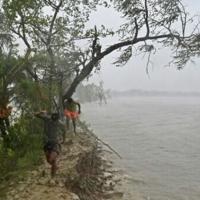When cyclone winds destroyed his home in 2007, Abdul Aziz, a fisherman from Bangladesh, relocated about half a kilometre inland to escape storm surge waves.
However, a year later, his old home was swallowed by the sea.
Now, at 75 years old, Aziz fishes above his former home that is now submerged. He lives on the other side of a low embankment made of earth and concrete that faces crashing waves.
Pointing towards his vanished village, Aziz said, “The fish are swimming there in the water on my land. It is part of the advancing ocean.”
According to government scientists, rising seas due to climate change are causing Bangladesh’s coast, which is densely populated, to drown at a rapid rate globally. It is estimated that at least one million people on the coast will need to relocate within a generation.
Abdul Hamid, director general of the environment department, stated in a report that few countries experience the effects of climate change as intensely as Bangladesh.
Based on satellite data from NASA and CNSA, a three-part study calculated that Bangladesh is experiencing a sea level rise more than 60 percent higher than the global average.
By 2050, at the current rate of sea level rise, more than one million people may have to relocate, the study projected.
– ‘Closing in’ –
Sea levels are rising at different rates around the world due to various factors, such as melting ice caps and ocean dynamics. According to A.K.M Saiful Islam, the lead researcher, Bangladesh’s above-average increases in sea level are driven by multiple factors.
Islam emphasized that policymakers should be prepared for mitigation and adaptation based on the study’s findings.
He pointed out that the sea level rise along Bangladesh’s coast is higher than the global average, posing a significant threat to the millions of people living there.
The incremental rise in sea levels, though small, is causing devastation to communities along the coast.
Those living in coastal areas are facing increased threats, with storms bringing seawater further inland and causing loss of crops and property.
– ‘Bodies can’t endure this’ –
The threat from rising sea levels is escalating, with cyclones becoming more frequent and intense in Bangladesh due to climate change.
Residents like Ismail Howladar, a 65-year-old farmer, are experiencing losses in agriculture and infrastructure due to seawater intrusion during storms.
Shahjalal Mia, a 63-year-old restaurant owner, has witnessed the sea encroaching on land year after year, causing displacement and economic losses.
The increasing occurrence of cyclones and heatwaves is putting immense pressure on the population, with temperatures reaching extreme levels.
Experts like Ainun Nishat from Brac University emphasize that the poorest are bearing the brunt of carbon emissions from richer nations, urging global action to combat climate change.
-‘Too late’ –
Bangladesh, ranked among the most vulnerable countries to disasters and climate change, is facing unprecedented challenges as temperatures rise and extreme weather events become more common.
The recent cyclone and heatwave are attributed to global temperature increases, highlighting the urgent need for international cooperation on climate change mitigation.
Nishat warns that time is running out for Bangladesh to prevent further disasters and emphasizes the need for collective action to address the growing climate crisis.
str-mma/sa/pjm/sco





